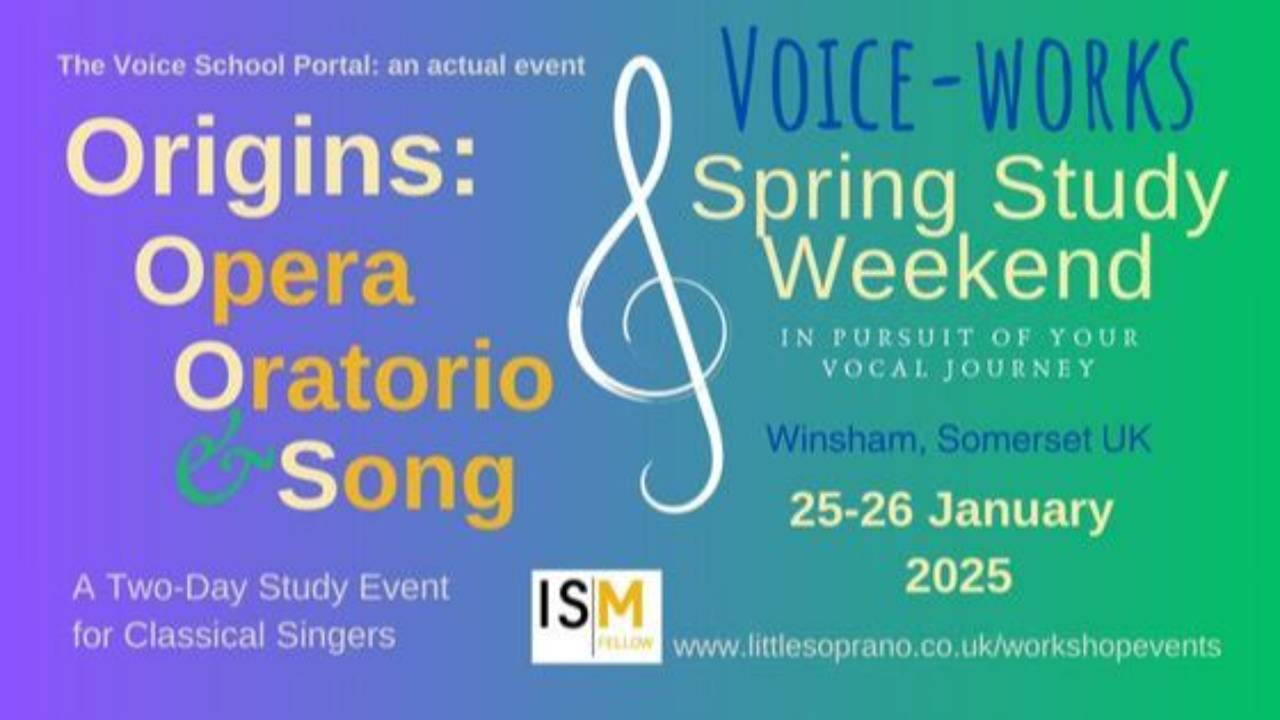Voice-works Spring Study Weekend
25-26 January 2025
Noticeboard: Inspiration & Resources



YouTube: Sharing our chosen repertoire ...
Let's collaborate! Add preferred performances of your 3 chosen pieces to our bespoke Voice-works Study Weekend YouTube Playlist.
Listen in, watch and enjoy the process of becoming familiar with all the repertoire we'll be studying together.
Click the button below to access and add your repertoire choices into the mix!
The PlaylistNot to be missed!
Voice-works Spring Study Weekend: a further comparison of our separate Processes
A freshly compiled comparison (in time for our July academic year finale), with the assistance of my lovely and insightful AI assistant (ChatGPT via TurboScribe).
Knowing how useful we have found more recent transcription analysis, I went back to the Spring Study event Turbscribe folder and asked the usual pertinent question. Interesting reading! Click the button below and enjoy.
Voice-works Spring Study Process ComparisonSummary of the Voice-Works Spring Study Weekend 2025 Transcripts
Below is a structured summary of the three requested transcripts, highlighting key discussion points, timestamps, and recurring themes.
1. Day One Discussion About 'Process'
Key Topics Discussed:
-
Understanding Personal Learning Processes (0:00 - 3:00)
- Discussion on how different participants approach learning and memorization.
- Journaling and documentation as a reflective tool.
- The balance between structure and intuition in practice.
-
Memorization Techniques & Challenges (3:13 - 6:25)
- Using anchor points in learning music.
- Adjusting methods when ill (e.g., silent study).
- The importance of pacing in memorization—comparison between short- and long-term retention.
-
Technical & Vocal Challenges (7:02 - 10:02)
- Struggles with moving away from relying on written copies.
- Need for stability in vocal technique.
- The role of breath management in phrasing and expression.
-
Emotional & Psychological Aspects of Singing (10:22 - 14:22)
- The effect of confidence on performance.
- Learning styles (visual, auditory, kinesthetic) and their impact.
- Adapting to technical challenges without self-judgment.
-
Discussion on Accuracy vs. Interpretation (14:22 - 24:02)
- Exploration of the idea that ‘accuracy’ in singing is relative.
- Examples of how different musicians approach musical fidelity.
- Strategies for balancing technical precision with musical expressiveness.
-
Comparing Learning Approaches Among Participants (24:20 - 47:53)
- Some favor methodical precision, others prefer an intuitive approach.
- Reflecting on personal growth over time.
- External feedback and its role in self-improvement.
🎯 Key Takeaway:
- Learning is a highly individual process, and recognizing personal strengths and areas for improvement is crucial.
2. Feedback from Day One
Key Topics Discussed:
-
Review of Day One Discussions (0:00 - 6:00)
- Participants reflect on key points learned.
- Agreement on the importance of incremental learning.
-
Shifts in Perspective on Memorization & Practice (6:01 - 12:30)
- Realization that some pieces require years to master, not weeks.
- The value of allowing time for pieces to settle into memory.
- Recognizing the importance of muscle memory and breath control.
-
Technical Adjustments and Corrections (12:31 - 20:00)
- Practical examples of misinterpretations in musical markings.
- Breath placement and phrasing refinements.
- Learning to embrace trial and error in practice.
-
Confidence and Performance Readiness (20:01 - 27:00)
- The impact of past learning experiences on present approaches.
- Overcoming fear of mistakes in performance.
- The mental aspect of singing—rewriting internal narratives about difficulty.
-
The Role of Emotional Connection in Singing (27:01 - End)
- Some singers focus heavily on technical mastery at the expense of emotional depth.
- The challenge of balancing precision with expressiveness.
- Discussion of different interpretations of what it means to ‘own’ a piece.
🎯 Key Takeaway:
- Growth requires both technical discipline and emotional connection.
3. Feedback Day Two
Key Topics Discussed:
-
Reflections on Study Weekend Progress (0:00 - 10:00)
- Participants analyze their individual learning processes.
- The benefits of group discussions in recognizing personal strengths and blind spots.
-
Detailed Vocal & Technical Observations (10:01 - 22:00)
- Specific repertoire challenges.
- The importance of understanding different stylistic requirements for various composers.
- Managing breath, resonance, and vowel shapes effectively.
-
Common Learning Styles Among Participants (22:01 - 35:00)
- Visual vs. auditory vs. kinesthetic learners in the group.
- The impact of structured vs. spontaneous learning approaches.
- Adjusting learning methods based on personal strengths.
-
Psychological Barriers & Overcoming Them (35:01 - 50:00)
- Identifying self-limiting beliefs in performance.
- The fear of making mistakes in front of an audience.
- How past experiences shape present confidence levels.
🎯 Key Takeaway:
- Understanding your learning style and emotional barriers is key to improving as a musician.
Most Popular & Repeated Topics Across All Sessions:
-
Memorization Strategies & Timing
- The importance of delaying memorization until a piece is fully internalized.
- Using anchor points effectively.
-
Breath Control & Phrasing
- Recognizing where natural breath points occur.
- Experimenting with different breath strategies to support phrasing.
-
Balancing Technical Precision with Emotional Depth
- Some participants struggle with finding emotional connection.
- Future focus: techniques for deepening expressive performance.
-
Overcoming Psychological Barriers
- Fear of mistakes and self-judgment were recurring themes.
- Strategies needed to build confidence in live performance.
-
Learning Styles & How They Affect Practice
- Visual vs. auditory vs. kinesthetic learning methods.
- Encouraging participants to tailor practice methods accordingly.
-
Self-Reflection & Journaling
- Keeping detailed practice notes helps track progress.
- Participants found value in writing about their learning experiences.
-
Repertoire Selection & Interpretation
- Understanding stylistic nuances for different composers.
- Adapting technical approach to suit each piece.
Conclusion
The Spring Study Weekend 2025 provided deep insights into individual learning processes, technical refinements, and psychological approaches to singing. The discussions highlighted a strong emphasis on memorization timing, technical consistency, and emotional connection.

